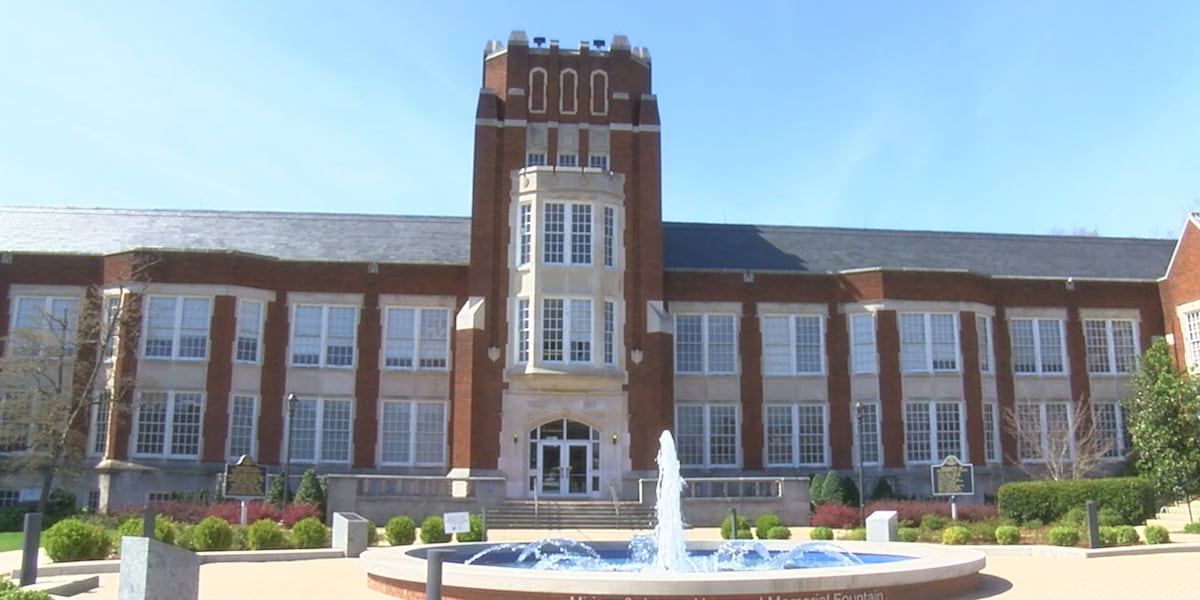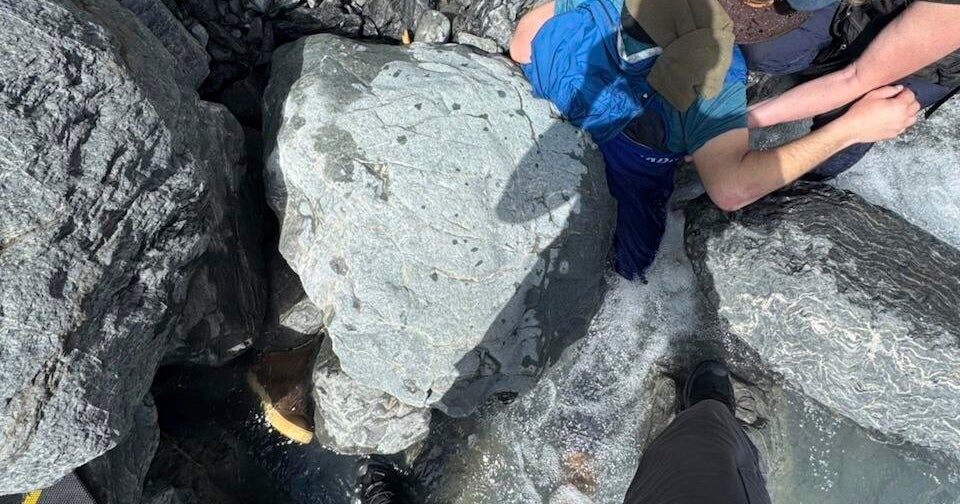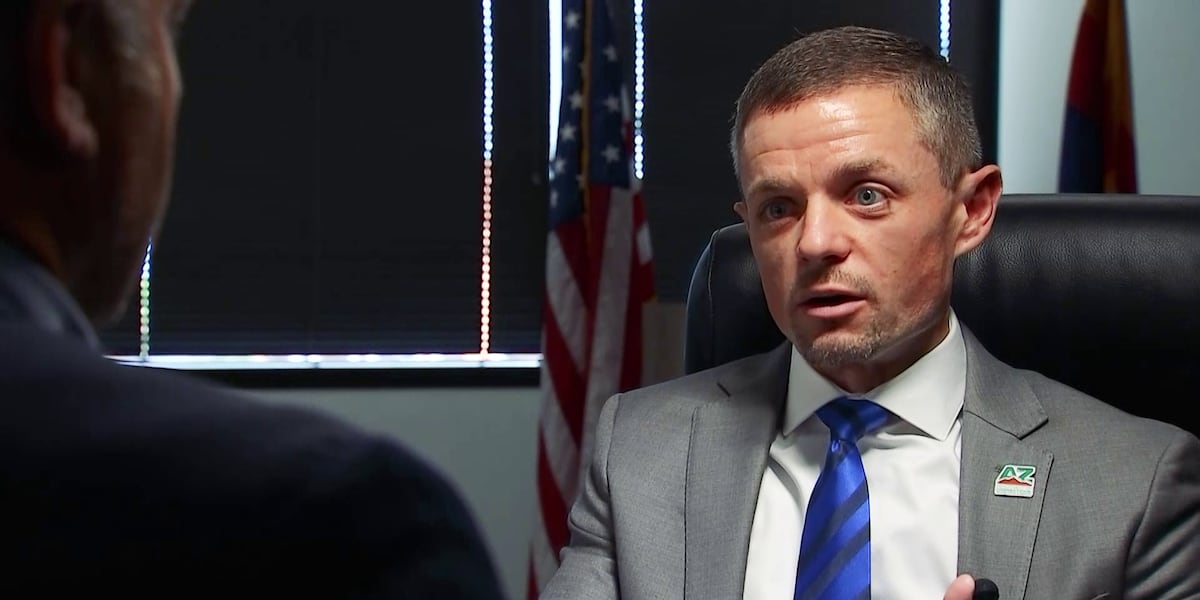Texas
After a turbulent summer, Texas A&M turns to Mark Welsh III to guide them through
:focal(0x0:3000x2000)/static.texastribune.org/media/files/7f1ba2ab04a90aac84c12c78721ba8f1/Mark%20Welsh%20TAMU%20MS%20TT%2004.jpg)
Sign up for The Brief, The Texas Tribune’s daily newsletter that keeps readers up to speed on the most essential Texas news.
COLLEGE STATION — A month into this year’s fall semester, Texas A&M University senior Ben Fisher got an email that took him by surprise. It was an invitation to the College Station home of interim President Mark Welsh III for a barbecue dinner with other student leaders.
When Fisher arrived, Welsh and his wife, Betty, ushered the students into their massive, white stone home, where they had set tables around the house for students to sit and eat. The couple gave tours of their home and invited other administrators from across campus to come and mingle with the students.
Over brisket and sausage, Welsh reiterated that he wanted to better understand students’ perspectives and priorities.
“It was incredibly personable,” Fisher said.
At one point, a student knocked a bunch of utensils and toothpicks onto the floor. Welsh — a four-star general and former leader of the U.S. Air Force — quickly got down on his hands and knees to clean.
“He’s helping scrub some mess up to take care of it so that someone else didn’t have to,” Fisher recalled. “For the president of your institution to kneel down to help clean something up is a pretty strong statement that he really values selfless service,” referring to one of the “Aggie Core Values,” guiding principles that current and former Aggies hold dear.
This summer, Texas A&M University System Chancellor John Sharp called on Welsh, then-dean of the Bush School of Government and Public Service, to help him clean up another mess: the state of the flagship university, which found itself embroiled in two employment scandals, one of which led the former president, M. Katherine Banks, to resign.
In July, The Texas Tribune reported that under Banks, the school watered down its job offer to journalism professor Kathleen McElroy after some board members raised concerns about her perceived liberal credentials. She ultimately turned down the job and settled with the system for $1 million after the hiring fiasco.
Soon after, the Tribune reported that the school placed a pharmacology professor on paid leave hours after she was accused by a politically connected student of criticizing Lt. Gov. Dan Patrick during a lecture, sparking concerns of political interference in university operations and threaten academic freedom.
Faculty were distraught, with professors going as far as to open a faculty meeting this summer with a moment of silence to recognize that a part of the university had “died.” Angry alumni were clamoring for answers.
Welsh, who was one of four finalists for the president’s role when Banks was hired in 2021, was tapped to lead the university as it conducted a national search for a new president. Ever since the university system’s Board of Regents appointed him interim president three and a half months ago, the former combat pilot has largely navigated the 77, 000-student university out of turbulent airspace and into clearer skies.
Since July, Welsh has been on a nonstop tour to try to rebuild the trust that slowly eroded over the past few years and reinstill the sense within students, faculty and staff that their voice is necessary to move A&M forward.
“The short-term goals were to make sure that I did everything I could to kind of get the university reconnected with itself,” Welsh told the Tribune on Wednesday. “Open up lines of communication that I think we’re a little bit frayed, and try and help relieve some of the frustration that was in place because of that less than ideal communication.”
This week, Sharp recommended that the regents name Welsh as the permanent president, forgoing a national search as originally planned. The board is scheduled to meet Friday morning to consider naming him the sole finalist for the position, kicking off a 21-day mandatory waiting period before regents can officially appoint him.
If approved, Welsh would come to the permanent position having built up a tremendous amount of goodwill among many faculty and students, who say he has provided a much-needed steady hand during a time of uncertainty.
Faculty say they appreciate that he seeks out their input. When he makes a decision they disagree with, he explains his rationale, they say. Students say they’ve appreciated his regular email updates — an average of at least one per week since he started — and they notice the increased level of transparency about university operations.
“It’s amazing to see how much he actually cares about the students and how much he’s trying to make a change for A&M,” senior Katie Hornick said.
While some faculty feel the system should commit to conducting a national search the next time it needs a president — and guarantee more room for faculty feedback in the hiring process — many professors and students agree with the decision to appoint Welsh as permanent president now.
“General Welsh has almost uniform positive evaluations from those who know him, who worked with him, who agree with him, who disagree with him,” medical professor Mark Sicilio said at a Faculty Senate meeting this week. “This is the best of a situation, and I wouldn’t even call it a bad situation because he is truly — based on my exposure and interaction with him — a remarkable individual.”
A military background
Welsh, a San Antonio native, is quick to say he is not an Aggie — a clarification meant as a show of respect toward those who did go to the university — though he was raised by an Aggie father, watched five of his siblings graduate from A&M and raised four children to bleed maroon and white. Instead, he attended the U.S. Air Force Academy.
“The only reason he didn’t come to Texas A&M was because he wanted to fly jets,” said Frank Ashley III, acting dean of the Bush School, who worked closely under Welsh for the past seven years.
After graduating in 1976, Welsh built a more than four-decade career in the Air Force before retiring from military service in 2016.
Welsh started out as a command pilot, then served in various roles like training commander and adviser to the director of the Central Intelligence Agency on military issues. He served as commander of NATO’s Air Command and was the 34th Commander of the U.S. Air Forces in Europe before heading to Washington, D.C., where President Barack Obama appointed him Chief of Staff of the Air Force and a member of the Joint Chiefs of Staff in 2012. He moved to College Station to serve as the dean of the Bush School the same year he retired.
Welsh had zero experience working in academia when he arrived. But he understood Aggieland, a place steeped in military customs that values its traditions and where there is a deep commitment to upholding the university’s core values — loyalty, integrity, excellence, leadership, selfless service and respect — which resonate with the armed forces’ mentality.
University leaders “don’t have to be an academic, but they have to have an appreciation of what the academics do,” Ashley said. “I think that’s very, very important. And I think if there’s one thing that Mark learned very fast, it was that appreciation.”
Welsh said he saw similarities between how to work with those in the military and faculty.
“Walk into a room full of Navy SEALs, or Army Rangers, or Air Force fighter pilots and tell them how they’re going to risk death tomorrow, and see how that goes for you,” Welsh said. “They need a voice, they need to be part of the discussion leading up to what we plan to do. Their expertise needs to be considered in planning. They are the pros.”
As dean, Welsh increased the Bush School endowment by 20% and added a teaching site in Washington, D.C. He would often walk the halls of the Bush School proactively seeking out faculty and students, Ashley said. It became customary for him to pop his head in the open door of a faculty office to check in, or he would plop down next to a group of students to ask what they were working on.
Reed Russell, a graduate student in the Bush School, said he appreciated how often Welsh made himself available to students during public forums, where he took questions directly.
At a recent event with alumni, Welsh repeated the comment that he is not an Aggie, but this time someone interrupted him to say he was just as much an Aggie as anyone else there.
“For an Aggie to say that of another person who’s serving this institution is very high praise,” said Fisher, the senior class president. “That is not lip service.”
Putting out fires
When Welsh became interim president this summer, he immediately assembled a group of administrators to review one of the major sticking points of the Banks administration: The Path Forward, a set of 41 changes Banks initiated across the university that reorganized administrative offices, merged certain colleges, centralized services and added new academic programs.
Faculty and staff have largely criticized the changes as poorly conceived and hastily executed, causing confusion among students and employees, and negatively affecting morale.
The group assembled by Welsh held more than 100 listening sessions across campus in a matter of weeks. Then, Welsh spent one morning in October taking questions from hundreds of employees and students, explaining why he was making changes to Banks’ plans or staying the course.
But Welsh also has had to tackle larger, more intangible issues — like the pervasive sense that political actors have overly influenced the university’ decision-making and threatened academic freedom, the long-standing principle meant to protect faculty and researchers from outside influences interfering in their work.
In his early days as interim president, Welsh made frank comments about how he would handle interference from regents or outside groups. He laid down clear lines of demarcation between university business and the board of regents that oversees the system’s 11 universities.
“Somebody can call and offer an opinion on something, but that doesn’t mean you have to accept it,” Welsh told the Faculty Senate in August. “I’ll just tell you that if a regent calls me and says, ‘Hey, I really am worried about this,’ I’ll say ‘Thank you for the call.’ But I’m not going to call the department head and tell them who to hire.”
Faculty said it was a welcome change from the communication style of his predecessor whose decisions and rationale they felt were shrouded in secrecy.

Retired General Mark A. Welsh III, then freshly appointed interim president of Texas A&M University, speaks at a press conference in the Flag Room of the Memorial Student Center on the Texas A&M campus in College Station on Aug. 2, 2023
Credit:
Courtesy of Meredith Seaver/The Eagle
Shortly after he was named interim president, the university organized a task force on academic freedom and faculty protection to review the university’s policies. The task force was created after faculty raised concerns with how the university treated pharmacology professor Joy Alonzo earlier this year when she was accused of criticizing the lieutenant governor in a lecture.
As of last week, the task force was still considering possible solutions, including a new committee to handle academic freedom complaints. Welsh said it was important to have those conversations and to make sure everyone, from university leaders to the board of regents, is on the same page.
“Let’s get back to actually showing how we use academic freedom in the classroom, let’s get our students to understand both sides of the issues that a professor might be presenting to us in my classroom, do that research that shows both sides of every potential solution,” he said. “That’s what we do at universities. And I think we’re on track to do all those things.”
Dealing with DEI
While Welsh has garnered broad support from faculty and students during his time as interim president, some outside groups have raised questions about him by accusing him of supporting diversity, equity and inclusion efforts. In recent months, Texas Scorecard, a website run by far-right activist Michael Quinn Sullivan, has labeled Welsh as a “DEI sympathizer,” emphasizing that he’s a former Obama appointee in an apparent attempt to paint him as left-leaning.
On Wednesday, Welsh dismissed those characterizations.
“I always find it entertaining when someone who has never met a person, or even been in contact with a person, gives an assessment of who that person is or what they are,” Welsh said. He described himself as a “conservative who really values traditional values, the corny stuff like faith and family and loyalty and respect, and honor and integrity, and courage, and all those things that really matter deep down to people.”
This spring, Texas Scorecard wrote a similar post about McElroy, the Black journalism professor whose hiring fell through at A&M. McElroy teaches at the University of Texas at Austin and was a long-time editor at The New York Times. Emails and text messages between A&M regents released by the system this summer revealed that Texas Scorecard’s article about McElroy’s past comments about diversity and her prior work experience struck a chord among the regents, who are appointed by Gov. Greg Abbott.
According to an internal report A&M released in August, Banks received calls from six to seven regents after the website published its piece. Board member Sam Torn emailed a quote from the article to board Chair Bill Mahomes stating he wanted an explanation about why McElroy was being considered to revive the university’s journalism program before he could approve her tenure.
It’s unclear if the website’s attempt to paint Welsh — a white man with a strong military background — as a “DEI sympathizer” is raising the same kind of concerns among the Abbott appointees. Regents did not respond to requests for comment.
But Russell said he appreciated Welsh’s comments that he would not be swayed by outside influence. He feels A&M needs that kind of strong leadership.
The university needs “someone who’s on it and has integrity and is really going to step up and involve everyone in the process of making a difference,” the graduate student said.
One of the first tasks Welsh will oversee if he becomes permanent president will be to oversee the implementation of Senate Bill 17, which bans diversity, equity and inclusion offices in public universities. The law goes into effect at the start of 2024. School administrators at A&M and other Texas universities have spent this fall shuttering DEI offices, relocating those employees and crafting legal guidance. Yet faculty and students across the state have expressed concerns that the law will lead to censorship of anything related to diversity, including within the classroom, despite stipulations in the law that teaching and research will not be impacted.
“It would serve the faculty well to have a permanent president in place to provide the guidance that the members of the faculty and librarians need to make sure we don’t do a disservice to our students,” Faculty Senate President Tracy Hammond said. “I believe Interim President Welsh understands both the importance of following the law and the value of academic freedom as it applies to research and the classroom.”
On Wednesday, Welsh said he agreed with the intent of the law.
“The intent is to make sure that we bring the most qualified people into Texas A&M regardless of where they come from,” he said. “I think that’s our job. And so find the best talent, bring it to campus and give it the best possible educational and life experience we can give them. And I think that’s all that bill is attempting to do.”

Texas A&M interim President Mark A. Welsh III and his wife Betty speak with students during Elephant Walk at Aggie Park in College Station.
Credit:
Meredith Seaver for The Texas Tribune
On Wednesday evening, Welsh tried to reiterate that point to seniors preparing for graduation when he made a surprise appearance at an A&M annual event, known as the Elephant Walk.
As he introduced himself, one student shouted “I love you” as others cheered. Welsh shot back, “Not as much as I love you.”
“This [tradition] is really about you taking the reputation of this university and of every Aggie and taking it out into the world and doing great things with it,” he said. “The core values go with you. Continue to act like you believe in them.”
Senior Ethan Finney said Welsh’s presence at one of the university’s lesser-known traditions is telling.
“He did not have to come out to this,” Finney said. “A speech like that shows what kind of Aggie and man and president he will be.”
Caroline Wilburn contributed to this article.
The Texas Tribune partners with Open Campus on higher education coverage.
Disclosure: Texas A&M University, New York Times, Texas A&M University System and University of Texas at Austin have been financial supporters of The Texas Tribune, a nonprofit, nonpartisan news organization that is funded in part by donations from members, foundations and corporate sponsors. Financial supporters play no role in the Tribune’s journalism. Find a complete list of them here.

Texas
ICE begins arrest at San Antonio immigration court

Watch CBS News
Be the first to know
Get browser notifications for breaking news, live events, and exclusive reporting.
Texas
Bill that would have banned Texas minors from social media misses key deadline
:focal(0x0:3000x2000)/static.texastribune.org/media/files/c00eed6d9f45b6e1ebacbb76d9df1920/0127%20School%20Choice%20Lufkin%20CO%20TT%2020.jpg)
Sign up for The Brief, The Texas Tribune’s daily newsletter that keeps readers up to speed on the most essential Texas news.
A bill that would have banned minors from having a social media account has missed a deadline to pass in the Texas Senate.
House Bill 186, filed by Rep. Jared Patterson, R-Frisco, sailed through the House 116-25 in May, but never received a vote in the Senate several days after a slew of teenagers spoke against it during a Senate committee hearing. The contents of the bill could still be attached to another as an amendment or as part of a budget stipulation, but it is unlikely this late into the legislative session, which ends Monday.
The proposal, the most far-reaching of the bills filed to address online dangers this session, would prohibit minors from creating accounts on social media sites, such as Twitter, TikTok, Facebook, Snapchat and more, and require users to verify their ages. Companies would have to comply with the ban by April 2026.
The bill would also allow parents to request the deletion of their child’s existing social media account, and a company must comply within 10 days.
The potential failure of the social media ban for minors comes as a surprise, considering Texas lawmakers have made regulating social media a priority this legislative session.
Gov. Greg Abbott has already signed Senate Bill 2420, which restricts children from downloading apps, into law and emphasized his support of protecting children’s online presence.
“Safety and online privacy for Texas children remains a priority for Governor Abbott, which is why he signed SB 2420 into law. Texas will empower parents to have more control over the online content their children can access,” said Andrew Mahaleris, his press secretary, when asked about Abbott’s support of HB 186.
Under HB 186, any website that allows users to curate and create content is considered a social media website and is cut off from minors. News and sports websites will be safe.
Lawmakers are also considering House Bill 499, by Rep. Mary González, D-Clint, which would require social media platforms to have a warning label about the association between a minor’s social media usage and significant mental health issues.
As of June 2024, 10 states, including Texas, have passed laws restricting children’s access to social media, according to the Age Verification Providers Association.
Studies show that 95% of youth aged 13 to 17 report using social media, with more than a third stating they use social media “almost constantly.”
Two years ago, the American Federation of Teachers and the American Psychological Association, among other national organizations, called out social media platforms for undermining classroom learning, increasing costs for school systems, and being a “root cause” of the nationwide youth mental health crisis.
Several social media platforms and application management companies have noted that the state’s measures to protect children are too far-reaching and will have an impact beyond their intended scope.
An Apple spokesperson said that while they share the goal of strengthening kids’ online safety, the current proposals coming out of Texas will require them to retain sensitive, personally identifiable information for every Texan who wants to download an app.
Most social media platforms and online applications ask for age verification before signing up, but Texas is looking for more intensive measures, according to the Age Verification Providers Association, such as requiring a license or outright banning minors until they can prove they are older than 16 or 18.
Congress is considering the Kids Online Safety Act, which does not require app marketplaces to collect and keep sensitive data, such as passports or driver’s licenses, from all users to verify age. Apple supports the federal legislation’s approach over Texas’.
The outright ban on social media for minors has also garnered criticism from many on social media, including prominent conservative accounts such as Ian Miles Cheong, Laura Loomer, and Libs of TikTok, who have denounced the bill for excluding video games from the ban completely and for leaving a loophole open for video applications like YouTube and TikTok due to the bill’s wording.
“Let people parent their children how they see fit. Parents are more than capable of controlling their children’s screen time. Stop nanny state legislation. This is what Democrats do, not Republicans,” said Loomer in a post on X, formerly known as Twitter.
The social media ban, even if passed via another bill, is expected to face challenges in court, as some argue that it violates the First Amendment.
“It’s going too far. It’s sweeping adult speech into it without realizing that by adding an unnecessary hurdle, it affects everyone,” said Kathleen Farley, a First Amendment lawyer for the Washington, D.C.-based Chamber of Progress.
She said that, just like video games, social media, and online applications already have a voluntary ratings system that parents can access before any minor can access a website or application, and anything more stringent is usually considered too broad a restriction for the courts.
“I think all of this shows a need for people to be better educated on the current parental controls that exist in app stores. There are already ratings and ways to prevent children from downloading certain apps,” she said. “The fact that this legislation is being pushed is either that people don’t know about it, or it’s too hard to use.”
Disclosure: Apple and Facebook have been financial supporters of The Texas Tribune, a nonprofit, nonpartisan news organization that is funded in part by donations from members, foundations and corporate sponsors. Financial supporters play no role in the Tribune’s journalism. Find a complete list of them here.
First round of TribFest speakers announced! Pulitzer Prize-winning columnist Maureen Dowd; U.S. Rep. Tony Gonzales, R-San Antonio; Fort Worth Mayor Mattie Parker; U.S. Sen. Adam Schiff, D-California; and U.S. Rep. Jasmine Crockett, D-Dallas are taking the stage Nov. 13–15 in Austin. Get your tickets today!
Texas
Apple hits back at Texas online safety law: ‘Better proposals’

Apple has criticized a Texas bill mandating age verification for app store users, insisting that “better proposals” exist to protect children online.
Texas Governor Greg Abbott signed the bill into law on Tuesday, requiring Apple and Google to verify the ages of app store users and obtain parental consent for minors to download apps or make in-app purchases.
Why It Matters
Over 80 percent of Americans support parental consent for minors who want to create a social media account, according to a 2023 Pew Research poll, and more than 70 percent back age verification before use of social media.
In June 2024, Surgeon General Vivek H. Murthy, who had regularly cautioned that excessive social media use among adolescents was linked to a higher risk of anxiety, depression, and body image issues, urged Congress to mandate warning labels on such platforms, alerting users to the potential mental health risks associated with them.
What To Know
Apple and Google, which own the two largest app stores in the U.S, had opposed the bill before it was signed, arguing that the law would require widespread data collection, even from Texans downloading non-sensitive apps that concern the weather or sports scores.
“If enacted, app marketplaces will be required to collect and keep sensitive personal identifying information for every Texan who wants to download an app, even if it’s an app that simply provides weather updates or sports scores,” Apple said in an official statement, according to Reuters.
Meta, which owns Facebook and Instagram, had argued that implementing age restrictions should occur at the app store level instead of in each app.
Getty Images
Apple and Alphabet, Google’s parent company, have recommended alternative solutions, such as providing age-range data only to apps that pose risks, rather than to every app accessed by a user.
Texas follows Utah, which passed a similar law earlier this year. At the federal level, the proposed Kids Online Safety Act (KOSA) advanced in the U.S. Senate but has stalled in the House.
Florida has also taken action against large tech companies over children accessing their sites, with the state suing Snapchat for failing to prevent kids under 13 from accessing harmful content.
What People Are Saying
Apple said in a statement: “If enacted, app marketplaces will be required to collect and keep sensitive personal identifying information for every Texan who wants to download an app, even if it’s an app that simply provides weather updates or sports scores.”
In 2024, Meta CEO Mark Zuckerberg said during a U.S. Senate hearing that parents should not “have to upload an ID or proof they are a parent in every single app that their children use. The easier place to do this is in the app stores themselves.”
Casey Stefanski, Executive Director, Digital Childhood Alliance, said: “The problem is that self-regulation in the digital marketplace has failed, where app stores have just prioritized the profit over safety and rights of children and families.”
What Happens Next
The Texas law will take effect on January 1, 2026. Another pending Texas bill would prohibit social media usage by anyone under 18, though it has not yet passed the state legislature.
-

 Culture1 week ago
Culture1 week agoDo You Know the English Novels That Inspired These Movies and TV Shows?
-

 Education1 week ago
Education1 week agoVideo: Columbia University President Is Booed at Commencement Ceremony
-

 Education1 week ago
Education1 week agoHow Usher Writes a Commencement Speech
-

 Politics1 week ago
Politics1 week agoExpert reveals how companies are rebranding 'toxic' DEI policies to skirt Trump-era bans: 'New wrapper'
-

 World1 week ago
World1 week agoEU reaches initial deal to lift economic sanctions on Syria: Reports
-

 Technology1 week ago
Technology1 week agoAMD’s new RX 9060 XT looks set to challenge Nvidia’s RTX 5060
-

 News1 week ago
News1 week agoRead the Full ‘Make America Healthy Again’ Report
-

 News1 week ago
News1 week ago'Golden Dome' Missile Shield To Be 1st US Weapon In Space. All About It
:focal(1x431:2999x2000)/static.texastribune.org/media/files/8b56b90163b9181591141e02785a95c5/0422%20We%20Wont%20Go%20Back%20Presser%20TT%20EG%2005.jpg)


















